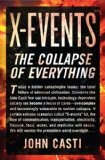|
|
It’s an aphorism that is phrased various ways. Yet the truth general truth of “It’s not the idea, it’s the execution” holds true in almost any endeavor. Books are no exception.
Sociologist Robert Bartholomew and Benjamin Radford, deputy editor of Skeptical Inquirer magazine, have an intriguing concept in exploring the media’s spread of hoaxes and furors over imaginary or minor events. However, the execution in their book The Martians Have Landed!: A History of Media-Driven Panics and Hoaxes doesn’t quite live up to the potential.
 The book looks at not only commotions spread by radio, television and newspaper but also through urban legend and on the internet. Given the potential breadth of these topics and the fact the latter two are continually growing, The Martians Have Landed! does a fairly good job of selecting subjects within these areas. Thus, we not only read about radio broadcasts of alien invasions, the phony stories that followed Hurricane Katrina and the uproar over Satanic cults but also fascination with chemtrails, the chupacabra, morgellons and the anti-vaccination movement. Yet editorially the book fails. The book looks at not only commotions spread by radio, television and newspaper but also through urban legend and on the internet. Given the potential breadth of these topics and the fact the latter two are continually growing, The Martians Have Landed! does a fairly good job of selecting subjects within these areas. Thus, we not only read about radio broadcasts of alien invasions, the phony stories that followed Hurricane Katrina and the uproar over Satanic cults but also fascination with chemtrails, the chupacabra, morgellons and the anti-vaccination movement. Yet editorially the book fails.
There doesn’t seem to be a sense of proportion. For example, while chapters on human organ thefts and the sexual abuse of children by Satanic cults are five pages each, some 11 1/2 pages are spent on a British story about a curse that supposedly causes fires in homes that have a copy of a widely sold painting of a crying child and 10 pages are devoted to the set-to in 1970s and 1980s Britain and New Zealand over “video nasties,” films on video cassettes criticized for their graphic violence. Although the longer pieces in the book are written by contributors, not Batholomew and Radford, the chapter on Satanic cult scares ends up paying lip service to all the elements involved in it while there is in-depth investigation of the painting story.
The chapters also have a tendency to have the tone of almost academic essay. In fact, the two chapters dealing with radio presentations supposedly documenting an alien invasion appear spun off from an article Bartholomew wrote for Skeptical Inquirer in late 1998. And almost every chapter seems to conclude with a somewhat censorious statement of the media’s role in initiating, misreporting or spreading the story and either a warning that it could happen again or that it could be even worse given the speed and massive reach of today’s media. Perhaps even more perturbing is The Martians Have Landed! seems to have lacked a highly attentive editor. It isn’t just that words are missing from some sentences; that, sadly, seems to occur far too frequently in the book market these days. It’s more that writers weren’t required to be a bit more dynamic or creative.
For example, a chapter on a story that spread in Taiwan in 1956 about a razor-wielding maniac says that “rumors swept through Taipei of numerous young girls being slashed at primary schools.” Five sentences later we are told that children were kept indoors because “rumors abounded about young girls being slashed at numerous primary schools.” Likewise, the second paragraph of the chapter on Satanic cults reports that “there was the odd story of satanic murder or kidnapping by wayward youths calling themselves satanists.” Nine paragraphs later we are told there are “reports of ‘Satanists’ killing people, but these are rare and usually involve attention-seeking youths who call themselves satanists in name only.” In neither case is the reader given new information, only a rephrasing of a prior sentence.
The Martians Have Landed! could have been an excellent compilation of or resource on media-inspired hoaxes or even just an interesting read. Sadly, it leaves us with a sense of a medley of short academic essays broadly summarizing the topic of the chapter. It is an idea failed in execution.
Fear and panic sell; skepticism does not.
Robert Bartholomew and Benjamin Radford, The Martians Have Landed!
Interesting Reading in the Interweb Tubes
- 40 years after Watergate, Nixon was far worse than we thought (“All reflected a mind-set and a pattern of behavior that were uniquely and pervasively Nixon’s: a willingness to disregard the law for political advantage, and a quest for dirt and secrets about his opponents as an organizing principle of his presidency.”) (via)
Bookish Linkage
Nonbookish Linkage
You’ve been sitting much too long
There’s a permanent crease in your right and wrong
Sly and the Family Stone, Title cut, Stand!
Too big to fail.
It’s a phrase that has become so ubiquitous that even the Federal Reserve has a definition on one of its web sites. From the Fed’s standpoint, an organization is “too big to fail” when it is “so important to markets and their positions [are] so intertwined with those of other [institutions] that their failure would be unacceptably disruptive, financially and economically.” But the complexity and interrelatedness of institutions aren’t limited to the financial sphere. There’s plenty of backbone systems whose failure could border on or would be downright calamitous.
 John Casti examines the issue and 11 potential human-caused scenarios in X-Events: The Collapse of Everything but he’s not just a 2012 apocalypse fear-monger. To the contrary, Casti is a senior research scholar at the International Institute for Applied Systems Analysis in Austria, where he works on the development of early-warning methods for extreme events in human society, and one of a number of scholars in the field of what is called “complexity science.” John Casti examines the issue and 11 potential human-caused scenarios in X-Events: The Collapse of Everything but he’s not just a 2012 apocalypse fear-monger. To the contrary, Casti is a senior research scholar at the International Institute for Applied Systems Analysis in Austria, where he works on the development of early-warning methods for extreme events in human society, and one of a number of scholars in the field of what is called “complexity science.”
At its most basic, a core theory appears to be that as society becomes increasingly complex, there is a point where all its resources are consumed just maintaining the current level. The next big problem is, in a way, the straw that breaks the camel’s back and there is a “complexity overload.” Some part of a complex system rapidly collapses and the adverse effects of this “X-event” forces the society to a much lower level from which it must/can rebuild. Granted, there are events that are beyond human control — asteroids, tsunamis, hurricanes and the like. But here’s plenty of potential human-caused events to make anyone ill at ease.
Among the 11 specific X-events Casti explores, some are probably less likely to occur, such as scientific experiments creating exotic particles that can destroy all or part of the earth or the creation of intelligent robots who eventually overthrow the human race. Most, though, seem wholly realistic, such as a a long-term and widespread failure of the Internet, nuclear war or terrorism, the drying up of world oil supplies, failure of the power grid or economic collapse. Perhaps even more alarming is the interrelatedness of these complex systems. As Casti points out, a failure of the power grid may well lead to the failure of the Internet. The failure of either could lead to economic collapse in a global economy in which commerce and finance depend on electronic transactions and information exchange.
Even a commonsense view of modern life indicates X-Events isn’t far-fetched speculation. Consider the electrical grid in the United States alone. Despite being one of the most advanced industrial nations, there have been several instances over the years where large chunks were taken down by human error and led to cascading effects. Think the internet can’t fail? Set aside the electrical grid and think of the seemingly inveterate trojans, worms and other malware in the system. Throw in government control in some nations, denial of service attacks and the like and, as Casti notes, “there are many ways to bring down the system, or at at least huge segments of it. The most amazing fact of all is that it hasn’t happened more frequently.” Throw in computerized trading and finance, let alone the concept of peak oil, and there’s plenty out there to worry about
But Casti contends it’s not all doom and gloom. To the contrary, the real message of X-Events is that if we are aware of the potential for human-caused X-events, they are avoidable or we can greatly reduce their potential damage. Casti warns, though, that doing so is “a painful, difficult, and time-consuming process.” One of our foremost problems, he says, is recognizing the risks and when they may be escalating.
We’ve been coddled and protected to the extent that we actually expect our governments and other public institutions to solve all problems and address our hopes and needs without cost or risk to ourselves. In short, we’ve fallen into the misguided belief that everyone can be above average, that it’s everyone’s birthright to live a happy, risk-free life, and that any misfortune or bad judgment or just plain bad luck should be laid at someone else’s doorstep. So the first step on the road to reality is to drop these visions of Utopia.
If there’s a sense of foreboding created by X-Events it isn’t just the potential events and consequences. In actuality, knowing of them is easy. The real difficulty arises in whether we have the political and social fortitude necessary to address them before an X-Event forces us to do so in dire circumstances.
Oil is the commodity of all commodities. Without it, nothing works in modern society as it’s currently structured.
John Casti, X-Events: The Collapse of Everything
Bulletin Board
- The interwebs are full of tributes to Ray Bradbury. I will offer just a remembrance. Of the hundreds of books I’ve read in my life, I can still remember sitting and reading The Illustrated Man in a particular room in my long since razed junior high school.
Interesting Reading in the Interweb Tubes
Blog Headline of the Week
Blog Line of the Week
Bookish Linkage
Nonbookish Linkage
You can’t have a civilization without [reading], can you? If you can’t read and write you can’t think.
Ray Bradbury, Salon.com
Stories can reveal much about a people, culture or nation. They tend to reflect not only tradition but the variety and evolution of beliefs and societal viewpoints. Although Miroslav Penkov now lives and teaches in the United States, his debut collection of short stories provides insight into his native Bulgaria a reader would never pick up in a travelogue or similar work.
 The title itself, East of the West: A Country in Stories, could be a definitive précis of the book. Penkov’s stories tell of life in and the people of Bulgaria in a guileless, congenial fashion. They reflect the mix that is part of Bulgaria, a country that may long for the West but retains pride in its Eastern roots. At least here, the history of Ottoman rule, the longstanding issues of the Balkan states, and the installation and fall of Communism remain relevant. The title itself, East of the West: A Country in Stories, could be a definitive précis of the book. Penkov’s stories tell of life in and the people of Bulgaria in a guileless, congenial fashion. They reflect the mix that is part of Bulgaria, a country that may long for the West but retains pride in its Eastern roots. At least here, the history of Ottoman rule, the longstanding issues of the Balkan states, and the installation and fall of Communism remain relevant.
What role does history play in Bulgarian society? The first story, “Makedonija,” opens with: “I was born just 20 years after we got rid of the Turks.” It proceeds to recount the man’s discovery of love letters his wife received in 1905 from a soldier fighting to free Macedonia from Turkish rule. The title story is set in two hamlets on the opposite banks of a river. They used to be one one village but following the Balkan Wars and World War I, the hamlet on the west side of the river is in Serbia and the one on the east is in Bulgaria. Set in part in the 1970s, the story tells of a romance between a boy and a girl on opposite sides of the river. “The Night Generation,” meanwhile, involves a family proud of its Turkish ethnicity but caught up in the Communist government’s late 1984 directive forcing citizens of Turkish heritage to adopt Bulgarian names.
The divergent generational views of the Communist era are more fully seen in “Buying Lenin,” which seems to have at least a touch of autobiography to it. It tells of a Bulgarian who comes to America in 1999 to attend the University of Arkansas, Penkov’s alma mater, and his exchanges with his grandfather, who fought for the Communists in 1944 and rose in the national party. With a touch of love, the grandfather and grandson call each other names like “you rotten capitalist pig” and “you communist dupe.” When the grandfather’s village reverts to communist times, the grandson goes on eBay to but him Lenin’s corpse.
East of the West is marked with a touch of humor that can at times seem to make the stories more identifiable. Thus, when the grandson arrives in Arkansas, the people who pick him up at the airport hand him a book, telling him “These are the words of our Savior. The world of our Lord.” The grandson replies, “Oh, Lenin’s collected works. Which volume?”
Likewise, the opening paragraph of “Makedonija” almost completely sets the curmudgeonly character of the narrator for us. After telling us his birth after defeating the Turks makes him 71, he says,
And yes, I’m grump. I’m mean. I smell like old men do. I am a walking pain, hips, shoulders, knees and elbows. I lie awake at night. I call my daughter my grandson’s name and I remember the day I met my wife much better than yesterday, or today. August 2, I think. 1969. Last night I pissed my bed and who knows what joy tonight will bring?
Yet East of the West isn’t exclusively about Bulgaria. Parts of it also relate to the American experience. In “Buying Lenin,” we get a sense of both acclimation to America but at the same time the sense of homesickness the narrator is surprised to encounter. And “Devshirmeh” tells of the life of a Bulgarian man who wins a green card in the lottery, comes to the U.S. with his wife and infant daughter but now lives the life of a divorced father who barely makes ends meet. Still, he seeks to instill in his daughter a sense of their heritage and background and how blood — family — can lead a person to set aside the worst in themselves.
Ultimately, the book is about the Bulgarian experience, whether there or as a Bulgarian living in America. While it would be unfair to call this Eastern European or Bulgarian literature, it is a fine introduction to some inventive, enjoyable writing and Bulgaria itself.
I fill up with memories of things long gone the way a gourd fills up with water from rain.
Miroslav Penkov, “Makedonjia,” East of the West: A Country in Stories
|
Disclaimer 
Additionally, some links on this blog go to Amazon.com. As an Amazon Associate I earn from qualifying purchases. There is no additional cost to you. Contact me You can e-mail me at prairieprogressive at gmaildotcom.
|
 The book looks at not only commotions spread by radio, television and newspaper but also through urban legend and on the internet. Given the potential breadth of these topics and the fact the latter two are continually growing, The Martians Have Landed! does a fairly good job of selecting subjects within these areas. Thus, we not only read about radio broadcasts of alien invasions, the phony stories that followed Hurricane Katrina and the uproar over Satanic cults but also fascination with chemtrails, the chupacabra, morgellons and the anti-vaccination movement. Yet editorially the book fails.
The book looks at not only commotions spread by radio, television and newspaper but also through urban legend and on the internet. Given the potential breadth of these topics and the fact the latter two are continually growing, The Martians Have Landed! does a fairly good job of selecting subjects within these areas. Thus, we not only read about radio broadcasts of alien invasions, the phony stories that followed Hurricane Katrina and the uproar over Satanic cults but also fascination with chemtrails, the chupacabra, morgellons and the anti-vaccination movement. Yet editorially the book fails.








